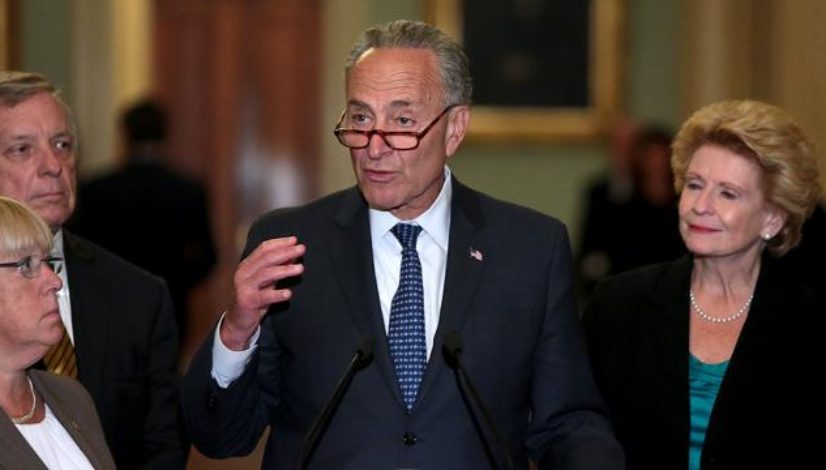Schumer misleads in his GOP tax reform critique
Sen. Chuck Schumer (D-N.Y.) simply detests the GOP tax plan. He claims it’s a giveaway to the wealthy and to big corporations and that “it would be a miracle” if it helped the middle class.
But is that really what’s got his dander up? Or is it that the tax package calls for eliminating state and local tax deductions, which would spotlight as never before the profligacy of blue-state politicians?
To pass tax reform with only Republican votes through budget reconciliation, which Democrat opposition will make a necessity, the planners had to find revenues to offset those lost to tax cuts.
Initially, House Speaker Paul Ryan (R-Wis.) proposed the border adjustment tax, which paralleled successful tax policies in rival countries like Germany. That approach was quickly denounced by Walmart and other retailers who argued it would raise consumer prices and hurt their businesses.
As a result, the reformers had to consider axing some of the so-called “tax expenditures,” which most of us call deductions. The granddaddy of those tax breaks is the exclusion of employer contributions for health-care insurance, which in fiscal 2018 is projected by the Tax Policy Center to cost the government $236 billion.
No other loophole comes close, but no one was going to touch a deduction that supports employer-provided health care. Not only would that possibly throw millions of workers onto the failing ObamaCare exchanges, but it would also have infuriated unions which have long fought for generous health-care benefits.
Eliminating other top-10 tax expenditures would have been bad policy, perilous politically or were already addressed elsewhere in the reform package, like the $113 billion in taxes lost to corporate profits stashed overseas.
Some encourage home ownership, like the mortgage interest deduction ($68 billion) and the exclusion of “net imputed rental income” ($113 billion) or were meant to reward work, like the earned income tax credit ($64 billion).
Heaven knows no one was going to take away the deduction for charitable contributions. Early in his term, President Obama mused about doing away with that loophole. He retreated in the face of blistering criticism from religious organizations, which take in the lion’s share of Americans’ $389 billion in gifts, and others who think (rightly) that private charities can spend the money more wisely than the federal government.
Eliminating the deductibility of nonbusiness state and local taxes other than on owner-occupied homes, saving $64 billion in fiscal 2018 and an estimated $1.3 trillion over 10 years, was the only path open that would rally Trump supporters.
Consider who will bear the greatest cost: The 10 states that ladle the biggest tax burdens on their residents are (in order) New York, Hawaii, Vermont, Maine, Minnesota, Connecticut, New Jersey, Rhode Island, Illinois and California.
Every single one of those states voted for Hillary Clinton. Most have had enduring financial problems stemming from overly-generous handouts to public-employee unions. Some, like Illinois and Connecticut, have compounded their fiscal woes by hiking taxes, in turn driving individuals and businesses elsewhere.
Residents of Oklahoma or Tennessee, among the lowest-taxed states in the union, must wonder why they are subsidizing the fiscal carelessness of other states. It’s a reasonable question. In response, many argue that New York and California, for instance, send to the federal government much more money than they take out in benefits.
That is true, but supporting figures do not include the cost of the tax deduction. In any event, if a state is generating substantial tax revenue, it is thanks to the success of individuals and businesses in those states, and those productive entities can move.
Bad fiscal policies eventually come home to roost, and taxpayers around the country should not be underwriting harmful practices.
Democrat leaders like Sen. Schumer understand how greatly their states could be harmed if residents can no longer deduct state and local taxes. Already, taxpayers are exiting New York, California and other blue states; that stream could swell to a torrent.
The GOP tax reform architects may well have included this provision not only to raise revenues, but as a fertile bargaining chip to barter for help eliminating the wealth tax, for instance, or for other measures unpopular with liberals.
Though Democrats will not help pass tax reform, there are plenty of centrists in Congress, including some from blue states, that will need to be wooed.
The tax plan now goes to the committees in the House and Senate responsible for crafting tax laws. The process is sure to be messy. For every change in tax policy, someone’s ox gets gored.
After efforts to repeal and replace ObamaCare were so embarrassingly unsuccessful, many question the ability of the GOP to pass any significant legislation.
But tax reform is a must-pass politically for Republicans. Importantly, the fractious Freedom Caucus in the House, which was helpful in sinking various ObamaCare replacement measures, has signed onto the proposals.
Also, Republicans are singing from the same songbook on this effort; during the health-care debates, they couldn’t even locate the tune. In particular, the sales pitch from the White House, which was intimately involved in the tax re-write, is considerably more energetic.
The stakes are high for President Trump and for the GOP. The stakes are also high for Sen. Schumer and other Democrats in fiscally irresponsible states.

Published on The Hill




